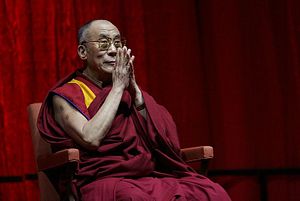As I discussed a few weeks ago, bilateral ties between China and Mongolia entered a deep freeze after the Dalai Lama, the spiritual leader of Tibet, traveled to Mongolia for an unofficial religious visit. China, which sees the Dalai Lama as a separatist leader, immediately froze all diplomacy with Mongolia, including ongoing talks over a critical $4.2 billion loan that would have come as an important lifeline for the country, which remains mired in economic recession. (More background on Mongolia’s circumstances here.)
The episode between the two countries has now taken on an interesting trilateral angle, with India — the Dalai Lama’s host country since 1959 — signaling that it may step up to help Ulaanbataar amid its alienation from China. Vikas Swarup, the spokesperson for India’s Ministry of External Affairs, recently acknowledged Mongolia’s situation, noting that India was “ready to work with Mongolian people in this time of their difficulty.” He continued:
During the visit of Prime Minister to Mongolia in May 2015, PM had conveyed to the Mongolian leadership that India will extend support to Mongolia in diverse fields. We had announced a credit line of US$ 1 billion during the visit. Mongolian leadership was highly appreciative of this gesture and conveyed that it would help them in obtaining investment and financial resources from their other partners. We are closely working with the Mongolian government to implement the credit line in a manner that is deemed beneficial to the friendly people of Mongolia by its leadership.
Mongolia’s ambassador in India, meanwhile, sought India’s assistance in helping Ulaanbataar out of its current problems with China: “It’s important that India raises its voice against the unilateral measures China is taking against us which is hurting our people specially when severe winter is upon us.”
In both China and India, media commentators have read the Indian spokesperson’s remark as a suggestion that New Delhi is seizing on an opportunity as Ulaanbataar and Beijing drift apart. However, viewed within the context of what India and Mongolia have achieved bilaterally in recent years — particularly since Indian Prime Minister Narendra Modi came to power in 2014 — the Indian position is simply an extension of existing policy, not an audacious attempt to substitute and supplant China in its own neighborhood.
Mongolia, which has famously pursued a “third neighbor” policy, seeking to deepen ties with countries beyond its “first” and “second” neighbors — China and Russia — has deepened ties with India considerably. Modi’s 2015 visit was an important milestone, and the two countries cooperate closely on defense and counterterrorism as well.
Despite these close ties, there is little that Delhi can realistically do to unilaterally help Mongolia out of its current fiscal circumstances. However, as some commentary in China suggests, this is likely not the sense in Beijing. Interestingly, China’s foreign ministry appears reluctant to comment on the matter of Mongolia seeking assistance from India, with its spokesperson appearing evasive on the question on multiple occasions in the past week. (Asked once, Lu Kang, the foreign ministry spokesperson, notes that he hasn’t “heard of this,” and the second time he tells the reporter asking the question: “I’d refer you to competent authorities for specifics.”)
The lack of official Chinese comment may suggest that Beijing is caught off-guard by Mongolia’s outreach to India over the post-Dalai Lama visit diplomatic and economic sanctions from the Chinese side. India, meanwhile, has yet to play any cards directly so far over the Mongolia-China divergence. New Delhi may sense an opportunity here to deepen ties with Ulaanbataar, but the cost of such a move may be a sharp deterioration of ties with China.
































